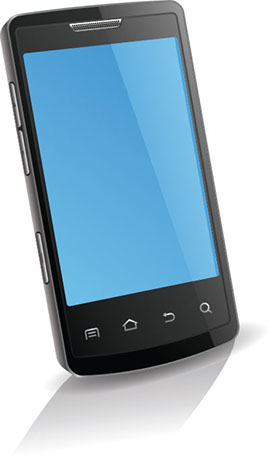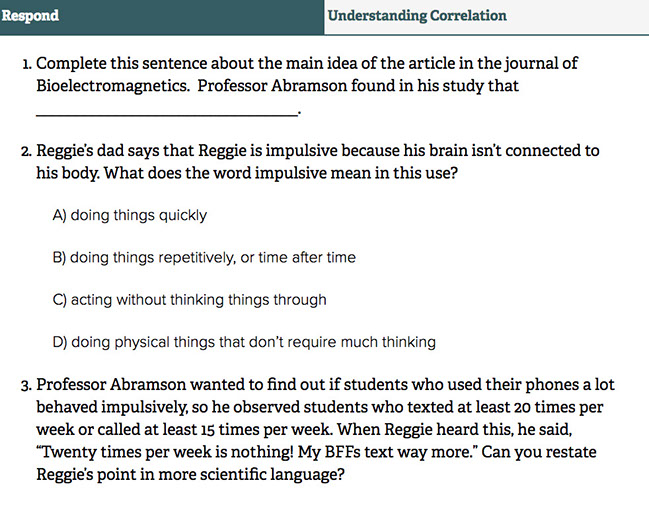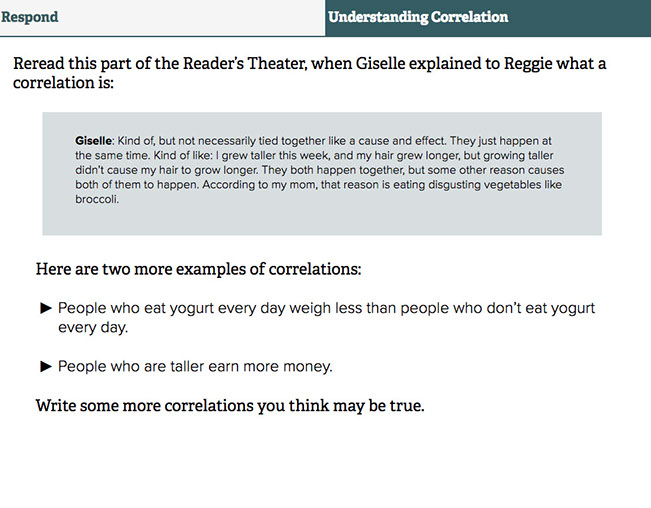SciGen Teacher Dashboard
Unit U3
The Power of Per
Side Effects of Texting
Ratio, Rate, and Percentage
Find Your Natural Walking Pace
Breathing Rate and Heart Rate Correlations
Free Throw Strategy Study
 Scene: Side Effects of Texting
Scene: Side Effects of Texting
Duration: Approximately 50 minutes
In this Science Scene, a dialogue to read aloud as a class, students meet Aymara, Giselle, and Reggie, who discuss the merits about a study that found a correlation between students who text frequently and students who make careless errors while taking tests. They begin a discussion about texting speed and hold a texting contest.
LEARNING OBJECTIVES
Students are introduced to the Focus Words, scientific language used throughout this unit.
Students demonstrate careful reading by identifying accurate details.
Students consider the perspectives of the characters through related questions.
Teacher Tips
- Think ahead about how you will assign the three roles (Aymara, Giselle, Reggie), perhaps in groups or by having volunteers read in front of the class. Note that students often willingly take on roles regardless of the gender of the characters.
- While it is possible for the students to read the PDF of the script online, we suggest printing the script for the students so they can hold it in their hands and mark it as they read. Consider scaffolding the lesson for English language learners: you could let them preview the script before the lesson or read the dialogue silently once and ask questions to a partner.
- Prior to the reading the script, explain to students that they will encounter new vocabulary terms and ideas that may not be familiar. Reassure them that this lack of familiarity is okay. The reading is meant to introduce the ideas, not explain them completely.
- Review the focus words of the week. The focus word chart linked on the unit overview page should be used as a resource for students to review definitions and sample sentences.
- This activity is intended only as an introduction to the concepts.
Teacher Tune-ups
Teaching Notes
ACTIVITY OVERVIEW
- Set the context (10 minutes)
- Engage with the script (20 minutes)
- Get clues from the script (10 minutes)
- Turn & Talk (10 minutes)
Set the context (10 minutes)
Initiate a class discussion prior to beginning the Science Scene. Students will see that there are many common phrases denoting rates that the encounter on a regular basis.
:
- 60 miles/ 100 km per hour
- 60 heartbeats per minute
- meters per second (light speed)
- $100 per day / per diem (travel allowance)
- $15 per hour (wage)
- 20 parts per million (or "ppm" dissolved solids in water)
- $2 per mile / per kilometer (taxi cab fare)
- 10,000 people per square mile / per square kilometer (population density)
- $10,000 per capita (GDP, the gross domestic product, a measure of national economic health or average income
- 20 pesos per U.S. dollar (exchange rate)
What kinds of words can you use to fill in these phrases?
______ per hour
______ per minute
______ per second
______ per day
______ per hour
______ per million
______ per mile / ______ per kilometer
______ per square mile / ______ per square kilometer
______ per capita
______ per U.S. dollar
Engage with the script (20 minutes)
Some teachers have several groups of students read at the same time. Other teachers select a few students to "perform" in front of the class.
:
In this script, two friends (Giselle and Reggie) talk to each other while another friend (Aymara) sends a link to an article. Aymara rapidly texts her friend about a study suggesting that there is a correlation between students who text frequently and students who make careless errors while taking tests. As the messages come in, Giselle reads Aymara’s messages to Reggie, and the two of them discuss the merits of the argument. Because they respect Aymara’s opinion, they ask her what she thinks. When her response comes back quickly, the three friends begin a discussion about texting speed and have a texting contest.
You may want to read the entire passage out loud to the class once before assigning roles to students or dividing up into groups.
The Script:
Characters: Aymara, Giselle, Reggie
Setting: Aymara just sent her friend Giselle a link to an article about texting. Giselle opened the article and she couldn’t believe what she was reading.
Giselle: This professor says we make more mistakes and say things without thinking because of texting.
Reggie: What are you talking about? No professor has been watching me text.
Giselle: (rolling her eyes) Uh, Reggie, when I said “we,” I meant teenagers, not you and me. Anyway, the prof says the problem is that phones figure out what you’re going to type after hitting two or three keys. Now we’re getting too used to phones making decisions for us. That makes us do things with more speed, but also with lots more mistakes.
Reggie: Hmm, yesterday I did send Aymara a text that read, “Hope Valley Day,” when it should have read, “Happy Valentine’s Day.” What’s the article say?
Giselle: You want me to read it out loud? Okay, here goes:
Australian scientists concluded that using text message systems that predict the word before you finish typing increases the likelihood that teenagers will make mistakes. After typing only two or three keys, most phones can predict the word the user is trying to type. And usually the phone is correct. It’s convenient, and it has trained teens to do a lot of things quickly. But teenagers are also making mistakes with more frequency.
Reggie: Yeah, someone’s always pointing out our mistakes. How about writing about how fast we are at typing?
Giselle: Reggie! Let me finish...
In 2009, Professor Abramson conducted a study that was published in the Bioelectromagnetics journal. He studied students between the ages of 11 and 14 and classified frequent users as students who either texted more than 20 times per week (1/4 of students) or who made at least 15 phone calls per week (1/4 of students).
Reggie: In 2009! Did they even have cell phones back then? Twenty times per week is nothing! My BFFs text way more.
Giselle: I know, right? Get this:
In the study, students took tests that were similar to IQ tests. The study concluded that there is a correlation between how often students texted and how fast their pace was as they completed the tests.
Reggie: Correlation? That means something’s connected, right?
Giselle: Kind of, but not necessarily tied together like a cause and effect. They just happen at the same time. Kind of like: I grew taller this week, and my hair grew longer, but growing taller didn’t cause my hair to grow longer. They both happen together, but some other reason causes both of them to happen. According to my mom, that reason is eating disgusting vegetables like broccoli. So this guy is saying that kids who text are likely to speed through the test. Let’s see...where was I...
Professor Abramson said, “The kids who used their phones a lot were faster on some of the tests but were less accurate. We suspect that using mobile phones a lot, particularly tools like predictive texts for SMS, is training them to be fast but inaccurate.” Abramson also claimed that students who used cell phones that predicted words as they typed were observed to do tasks without thinking them through. They were more impulsive. The ratio of wrong answers to total number of answers was greater.
Reggie: Okay, this isn’t cool. My dad better not see this. He already says I’m impulsive because my brain isn’t connected to my body. Now he’ll say that I’m impulsive because my cell phone is guessing what I’m typing. He’s going to unplug me!
Giselle: Well, maybe both are true?
Reggie: Hey!
Giselle: Wait, listen to what else Professor Abramson said:
“We don't think mobile phones are frying their brains. If you're used to operating in that environment and entering a couple of letters and getting the word you want, you expect everything to be like that.” He added, “Their brains are still developing so if there are effects then potentially it could have effects down the line, especially given that the exposure is now almost universal. The use of mobile phones is changing the way children learn and pushing them to become more impulsive in the way they behave.”
Reggie: (sarcastically) Nice of the professor to say that my phone isn’t turning my brain into french fries. But I think it’s too much to say that using phones makes teens impulsive.
Giselle: Yep, I agree. I don’t think phones cause us to make other kinds of mistakes either. Say, I wonder what Aymara thinks about this article? She sent it to us. Why don’t you send her a text and ask?
Reggie: (a few minutes later) Hey, Giselle, here is Aymara’s answer:
I don’t believe that an increase in texting is the cause for scores to decrease. There could be some other reasons for this outcome. For example, students who text may have been tired or the test has poor questions. I agree that using cell phones to text does make teenagers do things more quickly and also makes us expect quick responses to our questions. But that doesn’t mean that we are impulsive because we text. There are many teens like me who thoroughly think about things before acting or speaking! By the way, I turned off the “Text Predictor” tool on my phone, so I typed all of the letters in this message! - Aymara.
Giselle: (to Reggie) This is classic Aymara—totally logical and totally opinionated! And she typed every word! Man, this is really long. She must text, like, at the speed of light!
Reggie: Hmm, okay, that’s a good pace. But my thumbs hit the keys so fast, they burn the phone! I’m faster than Aymara.
Giselle: No way. Look, she filled my screen twice, no three times! Can you really beat that?
Reggie: But you don’t even know how long it took her to do the texting! She could’ve taken five minutes! Here, time me for 30 seconds using the timer on your phone.
(Thirty seconds elapse.)
Giselle: ... and STOP! Let me check how you did. Nineteen words in 30 seconds. That’s pretty fast! And I’m sorry but I’m counting LOL as one word. Not three. Okay, let’s figure out your speed: 19 words per 30 seconds. And I can shift that to a per minute rate by doubling. That’s 38 words per minute. For Aymara’s text though, we know she typed a lot, but we don’t know how long it took her. So I guess we don’t know a rate for her.
Reggie: How about sending Aymara a text and tell her to time herself as she texts? Then we can compare our rates!
(Giselle sends Aymara the message.)
Giselle: Aymara is up for the challenge. Look:
Tell Reggie he’s toast. -Aymara, Texting Queen
Get clues from the script (10 minutes)
When finished with the Science Scene, ask students to answer these three questions.
:
- Sample response: Professor Abramson found in his study that kids who text frequently and rely on predictive spelling are becoming more impulsive when taking tests.
- (C) acting without thinking things through
- Sample response: Reggie is suggesting that the teens observed in Professor Abramson’s study text far less than Reggie and his friends text.
:
- People who drive red sports cars drive faster than others.
- Students who participate in activities at school have better grades than those who don’t.
Turn & Talk (10 minutes)
Have students discuss the questions with a partner and try to reach an agreement. This activity is an opportunity for students to practice using scientific language as they discuss the questions.
:
- I do not agree with Aymara because ___ .
- I agree with Professor Abramson because ____ . For example, ___ .
- For the previous question, I ___ .
- Giselle most likely converted the rate to a minute because ___ .
- Giselle cannot determine Aymara’s texting rate due to ___ .
Discuss each question with a partner.
- Aymara believes since her friends use cell phones, they’ve learned to do many things faster and expect other people to answer their questions quickly. Do you agree with Aymara? Can you provide examples to back up your opinion?
- Professor Abramson thinks that if teens use tools to complete words when is texting, they will do many other things before thinking them through. Giselle, Reggie, and Aymara all disagree with the professor. What is your opinion?
- For the previous question, did you really think about it, or did you decide on your opinion instantly?
- Giselle timed how fast Reggie texted. His rate was 19 words in 30 seconds. Then Giselle calculated his rate of words per minute. Why do you think Giselle wanted to know how many words Reggie could text in one minute instead of 30 seconds?
- Aymara texted Giselle a long message. But Giselle couldn’t use it to compare Aymara’s texting speed to Reggie’s. Why not?
BETA Version - Please send comments and corrections to info@serpinstitute.org

